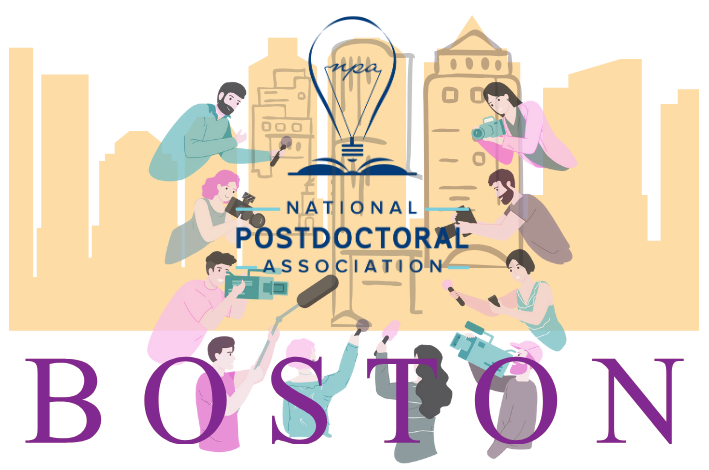Driving Change in Postdoctoral Professional Development: Highlights from pd|hub’s community discussion at NPA 2025
Date Posted: Friday, March 28, 2025
On Saturday, March 22nd, pd|hub team members, Cynthia Fuhrmann, Bill Lindstaedt, and Barbara Natalizio led a session entitled, Driving Change in Postdoctoral Professional Development: Lessons Learned from the pd|hub Collections at the 2025 National Postdoctoral Association (NPA) Annual Conference. This session brought together postdoctoral office (PDO) and postdoctoral association (PDA) leaders to engage in a dialogue about how to continue advancing postdoctoral professional development in the context of unprecedented challenges currently facing research and higher education.
The discussion began with a reflection on the origins of pd|hub, as an initiative to build recognition for the importance of career and professional development and to advance evidence based practices. This was followed by a brief overview and update on the pd|hub Collections framework.
Participants then transitioned to small groups where they defined pressing needs and brainstormed actions to take to continue advancing postdoctoral education in the coming years. They pondered questions such as: What are the current needs in postdoctoral education related to advancing career and professional development? What priority actions are needed to continue advancing this field, as individuals and as a united community at the institutional or national levels? Each discussion group focused on one theme. A summary of proposed actions is shared below.
We thank participants for sharing their valuable insights. Our hope is that these discussions will empower movement to action. These contributions will also help shape the ongoing evolution of pd|hub’s initiatives while reinforcing the importance of community-driven efforts. By working together as a community, we can drive meaningful change and strengthen evidence-based practices for postdoctoral professional development.
Empowering small offices to address a breadth of professional skills with reduced resources
- Leverage community resources (at institution or beyond) via cross-university collaborations or consortia
- Adapt graduate student workshops/courses for postdocs, or open student offerings to postdocs
- Make professional development co-curricular, such as what is offered through courses for students
- Support small offices via resources like the pd|hub Collections
- Developing CPD microcredentials for postdocs to encourage participation; this could be done through ongoing pd|hub communities of practice
- Enable small offices to jointly co-host events
Ensuring ongoing investment in professional development
- PDA senior leadership can encourage postdoc engagement with career and professional development (CPD) programming; peer-led programming may have added impact
- Surveys and data collection can support assessment and continuous program improvement
Increasing rigor in evaluation of educational programs
- Develop national-level guides for best practices (which could include short modules/lessons about evaluation design); host community of practice to support these efforts
- Create a database of educational evaluation experts willing to support initiatives (both qualitative and quantitative experts)
- Recognize the value of longitudinal data collection
- Achieve leadership buy-in for rigor
Disseminating effective approaches
- Identify CPD advocates locally; establish local communities of practice and/or host annual gatherings at the institutional level to discuss best practices (know your local partners)
- Explore the possibility of a CPD-focused journal or special issue
- Create peer review panels for CPD
- Share lessons learned from the Implementation Sites of the first pd|hub Collection (workshops/courses supporting career exploration)
- Continue offering pd|hub communities of practice to support effective implementation of workshops/courses, with value of connecting and learning across multiple institutions
Enhancing mentorship of postdocs for their career development
- Address institutional challenges that are barriers to postdoc participation in CPD
- Foster positive environments to encourage faculty mentorship of postdocs
- Develop a future pd|hub Collection focused on mentorship training and resources for faculty that focus on supporting career development; also include “mentoring-up” module for postdocs (how to attain career guidance from faculty mentors)
- Advocate for provost/dean-level policies and/or directives for faculty (e.g.,10% allowed time for postdoctoral professional development; note that professional development is part of the postdoctoral role under a federal OMB directive)
- Encourage professional societies/funding agencies to reinforce the value of mentorship by requiring postdoc professional development and recognizing institutions/individuals that prioritize career-related mentorship via awards
Increasing postdoc skills around public engagement
- Utilize advocacy group resources (e.g., FASEB) to teach skills such as letter writing and op-eds
- Elevate policy internships as an option, and create lists of opportunities
- Educate postdocs on institutional rules related to advocacy (i.e., speaking on behalf of their institutions or as an individual)
- Hone fundamental skill sets for public engagement, such as public speaking, storytelling, science communication; then, refine advocacy-specific skill sets
- Connect with other disciplines that already emphasize public engagement (e.g., public health) to build on existing infrastructures

